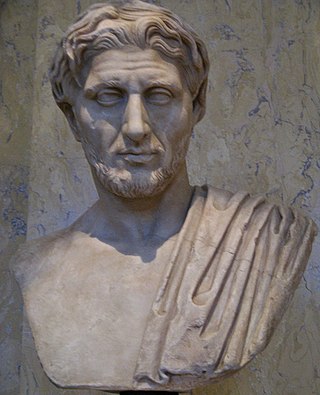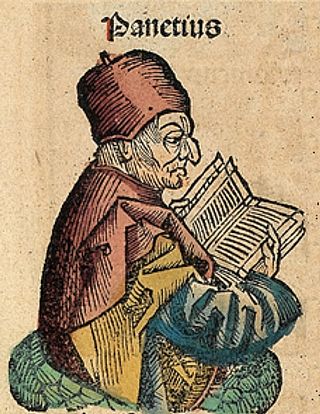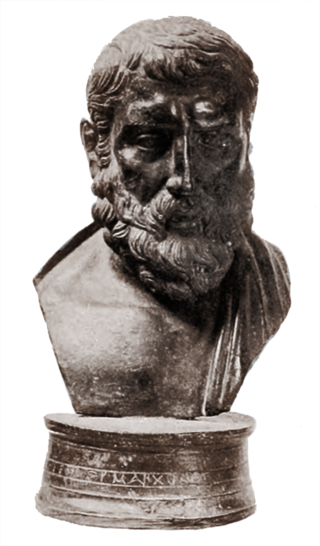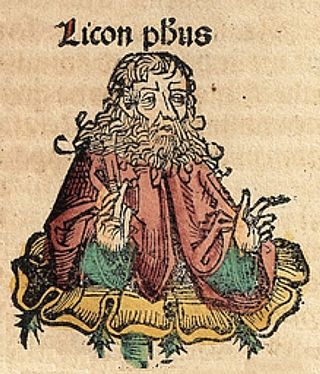Related Research Articles

Zeno of Citium was a Hellenistic philosopher from Citium, Cyprus. He was the founder of the Stoic school of philosophy, which he taught in Athens from about 300 BC. Based on the moral ideas of the Cynics, Stoicism laid great emphasis on goodness and peace of mind gained from living a life of virtue in accordance with nature. It proved very popular, and flourished as one of the major schools of philosophy from the Hellenistic period through to the Roman era, and enjoyed revivals in the Renaissance as Neostoicism and in the current era as Modern Stoicism.
Diogenes Laërtius was a biographer of the Greek philosophers. Little is definitively known about his life, but his surviving Lives and Opinions of Eminent Philosophers is a principal source for the history of ancient Greek philosophy. His reputation is controversial among scholars because he often repeats information from his sources without critically evaluating it. He also frequently focuses on trivial or insignificant details of his subjects' lives while ignoring important details of their philosophical teachings and he sometimes fails to distinguish between earlier and later teachings of specific philosophical schools. However, unlike many other ancient secondary sources, Diogenes Laërtius generally reports philosophical teachings without attempting to reinterpret or expand on them, which means his accounts are often closer to the primary sources. Due to the loss of so many of the primary sources on which Diogenes relied, his work has become the foremost surviving source on the history of Greek philosophy.
Crantor of Soli was an Ancient Greek philosopher and member of the Old Academy who was the first philosopher to write commentaries on the works of Plato.
Menedemus of Eretria was a Greek philosopher and founder of the Eretrian school. He learned philosophy first in Athens, and then, with his friend Asclepiades, he subsequently studied under Stilpo and Phaedo of Elis. Nothing survives of his philosophical views apart from a few scattered remarks recorded by later writers.

Demetrius of Phalerum was an Athenian orator originally from Phalerum, an ancient port of Athens. A student of Theophrastus, and perhaps of Aristotle, he was one of the first members of the Peripatetic school of philosophy. Demetrius had been a distinguished statesman who was appointed by Cassander, the King of Macedon, to govern Athens, where Demetrius ruled as sole ruler for ten years. During this time, he introduced important reforms of the legal system, while also maintaining pro-Cassander oligarchic rule.

Metrodorus of Lampsacus was a Greek philosopher of the Epicurean school. Although one of the four major proponents of Epicureanism, only fragments of his works remain. A Metrodorus bust was found in Velia, slightly different modeled to depict Parmenides.

Timon of Phlius was an Ancient Greek philosopher from the Hellenistic period, who was the student of Pyrrho. Unlike Pyrrho, who wrote nothing, Timon wrote satirical philosophical poetry called Silloi (Σίλλοι) as well as a number of prose writings. These have been lost, but the fragments quoted in later authors allow a rough outline of his philosophy to be reconstructed.

Panaetius of Rhodes was an ancient Greek Stoic philosopher. He was a pupil of Diogenes of Babylon and Antipater of Tarsus in Athens, before moving to Rome where he did much to introduce Stoic doctrines to the city, thanks to the patronage of Scipio Aemilianus. After the death of Scipio in 129 BC, he returned to the Stoic school in Athens, and was its last undisputed scholarch. With Panaetius, Stoicism became much more eclectic. His most famous work was his On Duties, the principal source used by Cicero in his own work of the same name.

Zeno of Sidon was a Greek Epicurean philosopher from the Seleucid city of Sidon. His writings have not survived, but there are some epitomes of his lectures preserved among the writings of his pupil Philodemus.
Clitomachus or Cleitomachus was a Greek philosopher, originally from Carthage, who came to Athens in 163/2 BC and studied philosophy under Carneades. He became head of the Academy around 127/6 BC. He was an Academic skeptic like his master. Nothing survives of his writings, which were dedicated to making known the views of Carneades, but Cicero made use of them for some of his works.
Idomeneus of Lampsacus was a friend and disciple of Epicurus.

Hermarchus or Hermarch, sometimes incorrectly written Hermachus, was an Epicurean philosopher. He was the disciple and successor of Epicurus as head of the school. None of his writings survives. He wrote works directed against Plato, Aristotle, and Empedocles. A fragment from his Against Empedocles, preserved by Porphyry, discusses the need for law in society. His views on the nature of the gods are quoted by Philodemus.

Diogenes of Babylon was a Stoic philosopher. He was the head of the Stoic school in Athens, and he was one of three philosophers sent to Rome in 155 BC. He wrote many works, but none of his writings survived, except as quotations by later writers.
Phaedo of Elis was a Greek philosopher. A native of Elis, he was captured in war as a boy and sold into slavery. He subsequently came into contact with Socrates at Athens, who warmly received him and had him freed. He was present at the death of Socrates, and Plato named one of his dialogues Phaedo.
Persaeus of Citium, son of Demetrius, was a Greek Stoic philosopher, and a friend and favourite student of Zeno of Citium.

Lyco of Troas, son of Astyanax, was a Peripatetic philosopher and the disciple of Strato, whom he succeeded as the head of the Peripatetic school, c. 269 BC; he held that post for more than forty-four years. He is also said to have studied under Panthoides the dialectician.
Theodorus "the Atheist", of Cyrene, was a Greek philosopher of the Cyrenaic school. He lived in both Greece and Alexandria, before ending his days in his native city of Cyrene. As a Cyrenaic philosopher, he taught that the goal of life was to obtain joy and avoid grief, and that the former resulted from knowledge, and the latter from ignorance. However, his principal claim to fame was his alleged atheism. He was usually designated by ancient writers ho atheos, "the atheist."
Dionysius the Renegade, also known as Dionysius of Heraclea, was a Stoic philosopher and pupil of Zeno of Citium who, late in life, abandoned Stoicism when he became afflicted by terrible pain.
Polystratus ; died 219/18 BCE) was an Epicurean philosopher, and head (scholarch) of the Epicurean school in Athens. He succeeded Hermarchus as head of the sect c. 250 BC, and was himself succeeded by Dionysius of Lamptrai when he died 219 or 218 BC. Valerius Maximus relates that Polystratus and Hippoclides were born on the same day, followed the sect of the same master Epicurus, shared their patrimony in common, and supported the school together, and at last died at the same moment in extreme old age.
Euphantus of Olynthus was a philosopher of the Megarian school as well as a historian and tragic poet. He was the disciple of Eubulides of Miletus, and the instructor of Antigonus II Gonatas king of Macedonia. He wrote many tragedies, which were well received at the games. He also wrote a very highly esteemed work, On Kingship, addressed to Antigonus, and a history of his own times. He lived to a great age.
References
- Dorandi, Tiziano (1999). "Chapter 2: Chronology". In Algra, Keimpe; et al. (eds.). The Cambridge History of Hellenistic Philosophy . Cambridge: Cambridge University Press. p. 47. ISBN 9780521250283.
 Laërtius, Diogenes (1925). . Lives of the Eminent Philosophers . Vol. 1:2. Translated by Hicks, Robert Drew (Two volume ed.). Loeb Classical Library. § 109–110.
Laërtius, Diogenes (1925). . Lives of the Eminent Philosophers . Vol. 1:2. Translated by Hicks, Robert Drew (Two volume ed.). Loeb Classical Library. § 109–110.
Attribution
 This article incorporates text from a publication now in the public domain : Jowett, Benjamin (1867). "Alexinus". In Smith, William (ed.). Dictionary of Greek and Roman Biography and Mythology . Vol. 1. p. 128.
This article incorporates text from a publication now in the public domain : Jowett, Benjamin (1867). "Alexinus". In Smith, William (ed.). Dictionary of Greek and Roman Biography and Mythology . Vol. 1. p. 128.